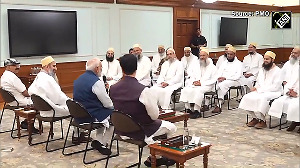But as her understanding of Afghanistan and its people and the US military occupation grew, she was drawn more deeply into the unfolding drama to rebuild the devastated nation.
So overwhelming was her commitment that when her NPR stint ended in 2002, she laid down her microphone for good and accepted a position in a nonprofit agency called Afghans for Civil Society, founded by Afghan President Hamid Karzai's brother. Being based in Kandahar, she had tremendous access to key players in the postwar government and forged not only unparalleled relationships with the Karzai family, but also with tribal leaders in the erstwhile Taliban heartland, the US military and diplomatic brass, and with leading figures in local government.
The Punishment of Virtue: Inside Afghanistan After the Taliban is her gripping and dramatic account of history in the making with all of the perverse turn of events of the US government and armed forces aiding and abetting the return to power of corrupt militia commanders and warlords, and the resurgence of the Taliban supported once again by Pakistan.
In an exclusive interview on the 5th anniversary of the invasion of Afghanistan, Sarah Chayes told Rediff India Abroad Managing Editor Aziz Haniffa that Pakistan's support for the Taliban never stopped, and describes Washington as pretty naive to have assumed that it would. The first of a five-part interview:
In your book, you strongly criticise the United States for not coming down hard on Pakistan, which you say continues to actively support the Taliban. Are you convinced that Pakistan has gone back to arming and sponsoring the Taliban?
It never stopped. And, it was pretty naive of the American government to assume that it would stop. This has been their national policy for the last 30 years to exploit an extreme religion to advance a regional, tactical agenda.
I don't believe Pakistan is behind 9/11, but I do think that for 30 years they have been using religious extremism in one form or another in their kind of power game in the region, and I don't think they ever stopped.
Even though there seems to be an appreciation in the Bush administration and the US Congress that Pakistan President Pervez Musharraf seems to be running with the hares and hunting with the hounds, officials seem to imply that they can only go so far in trying to come down hard on him because Musharraf is the only game in town. I believe he is playing a very clever game in that regard and that's exactly how he wants them to feel.
I live in Afghanistan and I am not the Pakistan person in the US State Department. But if I were in the American government, I would work very hard on developing an alternative. It's not that I would remove Musharraf or bomb Pakistan. That's not what I mean. I don't believe in violent regime change every time you get into an argument with somebody.
But I would really seriously staff up -- it's the American expression and it means, you put your staff to work for coming up with a new policy. I would deeply research how if we decided to be tough on Pakistan rather than roll over basically, what it would look like? What would the likely response be? How would we counter that likely response? Who else inside Pakistan has something interesting to say about the direction their country might move forward in? I would like to see the American government do that and I haven't seen it.
This is the answer I have always received, that, well, who else is there? So that means they are not working on alternative types of policy. It doesn't mean that you support somebody else instead of Musharraf, but what would it look like if we started tying benefits that we are offering to Pakistan to really concrete results, not just on the Al Qaeda front, but on the Taliban front. Because that is how they (Pakistan) are buying the United States off. It is by turning over Al Qaeda operatives.
While he visited Washington, (Pakistan President) Pervez Musharraf explained his agreement with tribal leaders in North Waziristan and said that President Bush is on board with it. What do you make of this agreement that has left a lot of people concerned that he seems to have cut a deal with people who might be sheltering Osama bin Laden, other Al Qaeda leaders and also the leadership of the Taliban?
We say, from a distance, tribal leaders, but what does that mean? Which ones? Who? In Kandahar, I would understand what an agreement like that would mean, but for Waziristan, I don't. The real problem in Afghanistan is not in Waziristan. Nobody who is doing anything bad to Afghanistan is sitting around in Waziristan. It has never been real. There have never been any major Taliban figures in North Waziristan.
I don't think Osama bin Laden is up there either. I believe what is happening in North Waziristan has everything to do with Pakistan. His little genie has gotten out of the bottle there and so there actually are extremist or jihadis up there who are a menace to Pakistan.
I don't think Osama bin Laden is in Pakistan. I think all of that is a smokescreen -- but that's my own opinion -- and the people who are troublesome to Afghanistan are in Quetta. They are not in caves. They are sitting around in apartments and driving cars that are often licensed with ISI plates in Quetta. So Waziristan is like a red herring.







 © 2025
© 2025